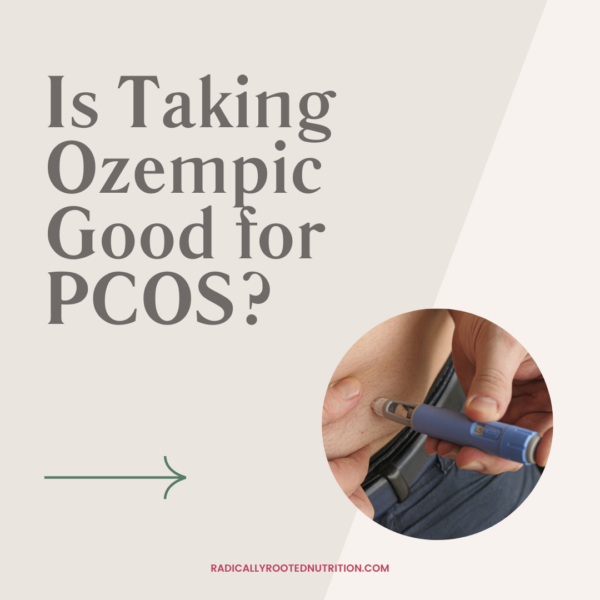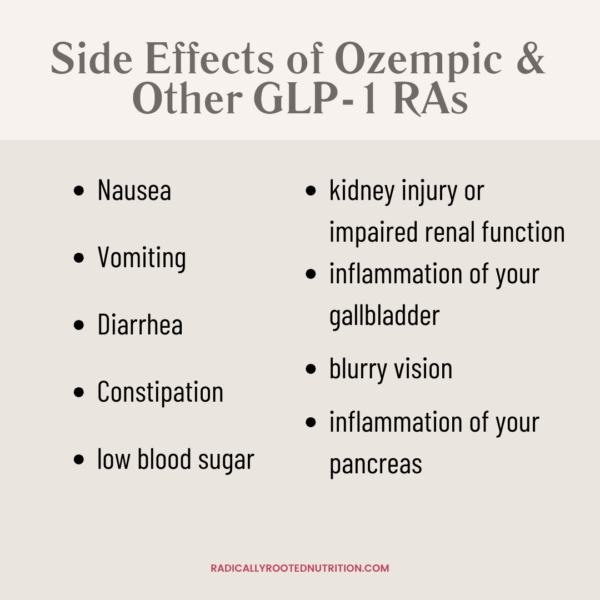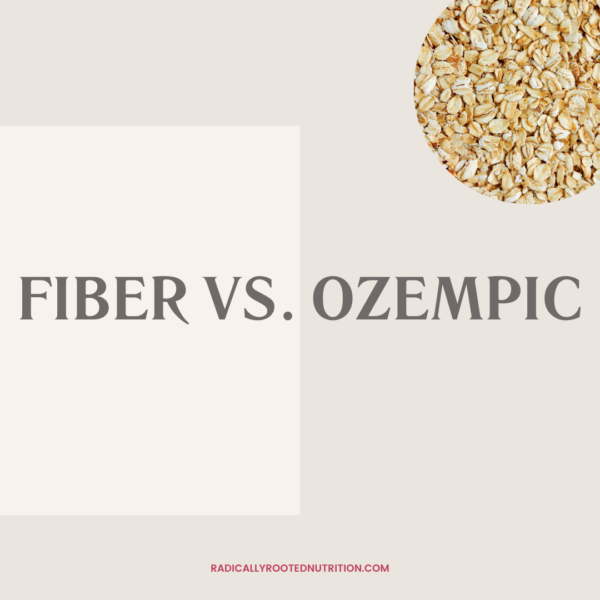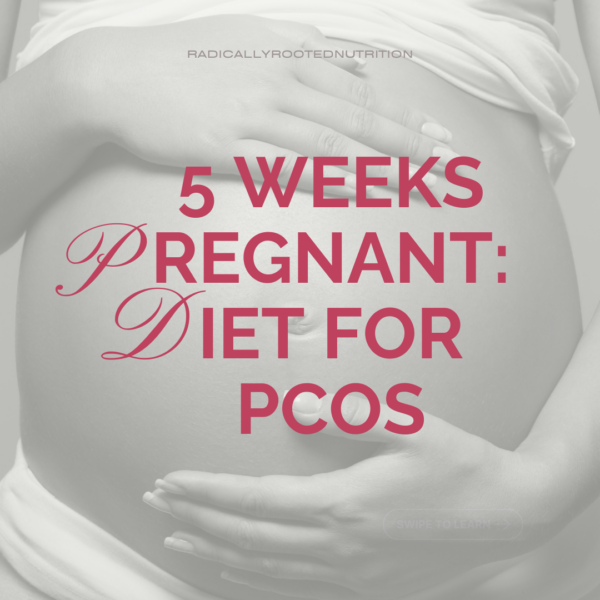Is Ozempic Good for PCOS?
If you or someone close to you has PCOS, you might be wondering if GLP-1 receptor agonists like Ozempic could help manage the condition.
These days, we have all heard of medications like Ozempic, Wegovy, and Mounjaro, which belong to the class of Glucagon-like peptide 1 receptor agonists (GLP-1 RA). These drugs were originally manufactured for diabetes patients, but are now being widely used for their weight loss effects. From Oprah to hundreds of other celebrities and people raving about the astonishing weight loss effects of this prescription medication.
The question is, if this medication can produce such high-quality results in these individuals, how can it work for people with PCOS who likely struggle with insulin resistance and/or obesity? We all want to know is Ozempic good for PCOS?
Here is what we know about taking Ozempic for PCOS.

What is Ozempic and Glucagon-like Peptide 1 Receptor Agonists?
Ozempic is a GLP-1 Receptor Agonist (GLP-1 RA) medication used to help control blood sugar levels in people with type 2 diabetes. It works by mimicking a hormone called glucagon-like peptide-1 (GLP-1) in our body.
How GLP-1 manages blood sugar and weight:
- helps your pancreas produce insulin when your blood sugar is high
- slows down how fast your stomach empties, which can help control your appetite and weight.
- Delays stomach emptying. When digestion is slowed, food gets released more slowly, preventing blood sugar from spiking after a meal.
Ozempic is usually given as an injection under the skin once a week.
GLP-1 RA medications, such as Ozempic, have been found to promote weight loss in some individuals, but not all. Studies suggest that these drugs can reduce the risk of heart disease, including heart failure, stroke, and kidney disease. Additionally, they may help to improve blood pressure and cholesterol levels.

Most Common Side Effects of Ozempic and GLP-1 RAs
The most common side effect of taking Ozempic and other GLP-1 RA medications is gastrointestinal.
- Nausea- the most frequent adverse event, occurring in 10-50% of patients. It may decrease over time with continued use.
- Vomiting
- Diarrhea
- Constipation
Severe side effects may include:
- low blood sugar
- kidney injury or impaired renal function
- inflammation of your gallbladder
- blurry vision from damage to your retina
- inflammation of your pancreas
The PCOS and Ozempic Connection
- PCOS and insulin resistance frequently go hand in hand. It’s estimated to affect between 50% and 70% of people with PCOS, even if they are not overweight or obese. Some experts say that all PCOS patients should be treated for insulin resistance by default. This can help keep insulin resistance from progressing to diabetes.
- Up to 70% of people with PCOS have abdominal obesity which is commonly associated with comorbidities that include type 2 diabetes, cardiovascular disease and hypertension.
- Women with PCOS have been shown to have impaired levels of appetite regulating hormones like ghrelin and leptin that could contribute to increased hunger levels.
The key features of PCOS are type 2 diabetes, insulin resistance, and obesity, which are conditions that Ozempic effectively treats. Plus, losing weight is a highly effective way to manage the symptoms of PCOS.
How is Ozempic Good for PCOS symptoms?
Currently, there are no drugs approved to treat PCOS specifically, and its symptoms are typically managed with lifestyle modification. Due to the very limited amount of government funding for research trials, it has been decades since any advancement in PCOS medical treatment has been made.
Medications can help manage some symptoms of PCOS. Depending on the specific symptoms and health needs of an individual, healthcare providers may prescribe a combination of oral contraceptive pills, antiandrogen medication (such as spironolactone), insulin-sensitizing medication (such as metformin), ovulation-inducing drugs (like clomiphene), and even statins.
But now comes along Ozempic and other GLP-1 RAs. Researchers and healthcare providers are increasingly exploring these medications as another medical tool that can help alleviate PCOS symptoms.
While the exact relationship between PCOS and its associated health problems like obesity and hormonal imbalance is complex, weight loss with PCOS is associated with improvements in many PCOS symptoms.
The use of GLP-1 RA alone or in combination with metformin has been studied in women with PCOS. Several studies showed weight loss and testosterone reductions, with mixed results regarding improvements in insulin resistance and period regularity.
A meta-analysis of 8 randomized trials compared the benefits of GLP-1 RAs versus metformin in women with PCOS. GLP-1 RA was superior to metformin in improving insulin sensitivity and reducing BMI and abdominal circumference. GLP-1 RAs had similar effects on menstrual frequency, total testosterone, free androgen index, SHBG, dehydroepiandrosterone sulfate (DHEA-S), hirsutism, LH, fasting blood glucose, fasting insulin, triglycerides, total cholesterol, and blood pressure when compared with metformin
Pregnancy rate was studied in a trial involving women with PCOS, who were randomized to receive either the GLP-1 RA exenatide 10 μg twice daily or metformin 1000 mg twice daily for the first 12 weeks. Then all patients were treated with metformin alone during the second 12 weeks. During the second 12 weeks, the rate of natural pregnancy of exenatide-treated patients was significantly higher than metformin-treated patients (43.60% vs 18.70%).
So far the research shows that GLP-1 RAs can help patients with PCOS lower their glucose and insulin as well as improvements to sex hormones and period regularity but that is if they can tolerate the side effects. BUT, due to limited research, so many more questions still remain.
Pregnancy Diet for PCOS When you are 5 weeks pregnant with polycystic ovarian syndrome (PCOS), it is crucial to focus […]
Upcoming clinical trials with Ozempic and women with PCOS
There is a new clinical trial comparing the effect of semaglutide (aka Ozempic’s active ingredient) and metformin on weight loss in obese women with PCOS. This study has not yet started but is expected to be completed in early 2024.
Another trial is recruiting women aged 12-21 with PCOS to compare treating PCOS with semaglutide (aka Ozempic’s active ingredient) versus an active lifestyle. It is also expected to be completed in 2024.
Diet alternative to Ozempic (without the side effects)
Fiber. Yep, I said it. A high-fiber diet can have similar effects to Ozempic in managing PCOS symptoms, particularly in addressing insulin resistance and weight management. Some high-fiber foods can help stimulate the release of GLP-1, the same hormone that Ozempic mimics. These, in turn, regulate how rapidly your stomach empties, how tightly your blood sugar levels are controlled, and even how hungry you feel just like Ozempic. Plus, we don’t have to worry about possible side effects or risks associated with taking a medication.

Tips for Taking Ozempic or Glucagon-like Peptide 1 Receptor Agonists for PCOS:
- It is recommended to start with the minimum dose of medication until your side effects go away or become very minimal. It is not advisable to hurry to increase the dosage as it will only worsen the side effects.
- If you experience nausea, you may take anti-nausea medications like Zofran to reduce it. Additionally, you could try eating bland foods such as crackers or follow the “BRAT diet” which includes bananas, rice, applesauce, and toast. Eating frequent small meals can also help alleviate nausea. Gas-X or other over-the-counter medications can help with fullness and gas.
- Set a timer if you find yourself forgetting to eat.
- Focus on getting protein in at meals to improve overall protein intake. Drinking protein-rich smoothies between meals can help.
- Consider taking a multivitamin to help optimize nutrient levels.
- If you take birth control pills, your doctor will likely recommend that you switch or add a form of birth control. They may advise you to switch to a non-pill form of birth control, such as the patch or vaginal ring.
The Bottom Line
PCOS is a common disorder for women of reproductive age, and many experience a degree of obesity, diabetes, and insulin resistance. Insulin resistance is commonly linked with PCOS, which may also be one of the reasons why medications like Ozempic—which can increase insulin sensitivity and help you lose weight—may help with PCOS symptoms.
Despite evidence pointing to Ozempic being a promising tool in the treatment of PCOS symptoms, GLP-1 drugs are currently only approved by the FDA to treat diabetes and overweight or obesity. If your healthcare provider thinks Ozempic or other GLP-1 medications might help you manage PCOS symptoms, they will prescribe the drug off-label.




